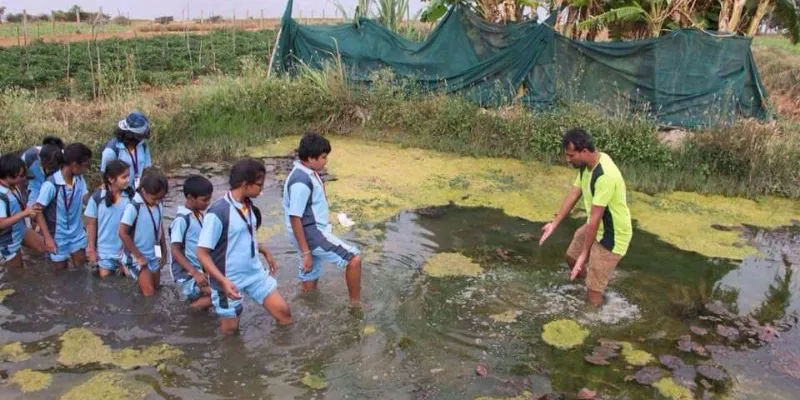This woman entrepreneur aims to build a child-centric education system with Aurinko Academy
Chetana Keni started Aurinko Academy when she saw the disconnect between education and requirements of the future. Focusing on skill-based education, it offers children the opportunity to learn and have fun.
Present-day schooling can be stressful, and learning can seem purposeless for many students, especially when the education system is more result-oriented, than learning oriented. With the pressure of exams and grades, students often lose faith in the system.
Dissatisfied with the current education system, Chetana Keni started homeschooling her son in 2005. She felt that the curriculum did not focus on skills that children would need 20 years down the line.

Chetana Keni, the founder of Aurinko Academy
In 2006, she started working on her concept of skill-based schooling and formulating her Toolkit4life project. The Toolkit4life is a series of skill-based programmes that can be implemented by teachers, parents, and school authorities.
She started imparting alternative education to her son along with some more children at her home. In 2011, parents who knew of the work Chetana was doing, approached her to work with their children full-time. They wanted their children to forego mainstream education and take up alternate schooling. This prompted Chetana to turn her home-run school to the , a progressive learning space in Bengaluru.
Desire to make a difference
Chetana has a doctorate in Educational Psychology and a double Master’s in Commerce and Psychology. The 43-year old worked for nearly 10 years in the corporate sector with companies like Intel, KPMG, AOL, and Dell before she ventured into the education space.
Chetana believes children are the greatest assets in nation building. While growing up, she attempted to be a changemaker at home, in school and in her community. She narrates how as a 7-year-old she stood up for the women in her family. She noticed that women would eat only after the men had eaten. Even though it angered the elders in her family, her grandfather decided that the women would eat first and the men would eat later. Later on, she even started a movement against eve-teasing in her community. She would be always raising her voice against injustice meted out on animals. She would stand up for less fortunate people, like the maid who worked for her family. She says that at that age she did not know how to articulate and communicate these ideas as well and is thus, helping children at Aurinko become better changemakers.
As time passed, the desire to bring change turned to making a difference in the country, which she hoped to do through focussed-education, and development of life skills.
Through education, she says, “If I can make a difference by creating an ecosystem that skills children, they can have a fulfilling life and be happy, content and contributing citizens with a purpose for life.”
With the idea of skill-based education, Chetana started Aurinko in 2011 and the school currently has 150 children from kindergarten to Grade XII. On April 1, 2020, Aurinko completed 10 years.
Child-centric approach to education
Like other schools, Aurinko has regular subjects like Maths, Sciences, Languages and others that are part of the National Education Framework. The school follows the XSEED ICSE curriculum. Children co-create the curriculum with teachers and peers. However, the way of teaching, learning experience and outcomes are what differentiates it from normal schools.
Learning is more hands-on and practical. Students learn to apply learning to real world scenarios. Giving an example, Chetana explains that the students took over six months to build a pond in the school when they were learning about pond ecosystems.

Students at Aurinko built the pond over 6 months while learning about pond ecosystems.
“Children blossom when they are given love, attention, resources to work, freedom of speech, freedom to learn at their pace, stimulations to keep them engaged, proactive trusting, open minded invested mentors to listen and guide them and an inspiring place to work with role models around them. All this is available at Aurinko. It is child-centric and not curriculum or output centric,” says Chetana.
Children can also learn skills like carpentry, electrical, electronics, mechatronics, robotics, art, craft, design thinking, coding, theatre, fitness, sports and more. They also take care of the school and learn valuable lessons in the process.
To make learning more fun and interesting, the school has incorporated gamification, technology, collective learning, creative learning and others to make learning fun, interactive and interesting. Learning at Aurinko is not limited to classrooms, the children go outdoors, and travel and interact with the community, says Chetana.
She adds, “Children belong to the future. We need to constantly help them skill themselves for life and its various phases - teenage, adulthood, middle age and old age. Schooling generally looks at this in a very myopic way, it only caters to academic pursuits with a sprinkling of sports or some arts which is usually at a superficial level.”
Even helping children plan for their careers is part of education. Chetana explains that until Grade VIII, the children are taught to understand their passions, challenges and then match them to probable careers. They are given opportunities to intern or be shadow professionals to imagine how their future may be like. They map out a 10-year plan of the subjects they want to take from grade IX to college, and what achievements would help them have a successful career.
“Every year, children show a great deal of interest to map these career choices with community service and sustainability issues. This ensures that our teenagers have a sense of purpose, they own their decisions and they are pretty focussed in life.”
Building an ecosystem
Teachers, students, and parents play a part in this ecosystem. Parents are also actively involved in the schooling process. They help organise workshops with professionals from their network and help children practise the learnings at home. Chetana received monetary help from the parents when she wanted to build the second campus.
Even during this lockdown, the students are learning to do activities at home like cooking, cleaning, taking care of their siblings, gardening and others. Through a Whatsapp group, children and parents start a challenge or activity which is then taken up by others as well.
“My highs come from my children’s smiles every day. It's what I work for, and I'm satisfied at the end of the day,” she says.
(Edited by Rekha Balakrishnan)







